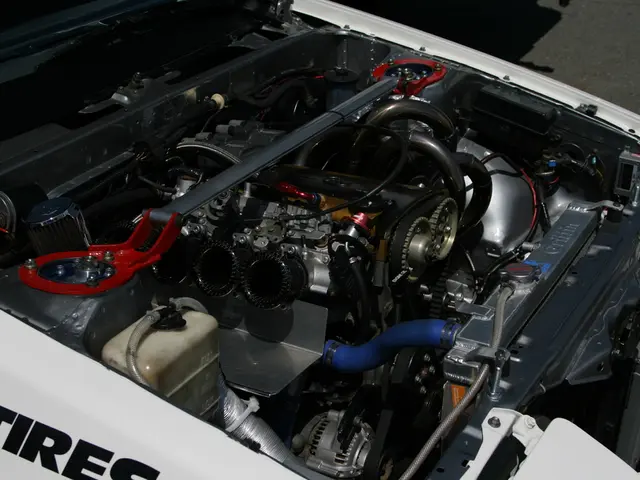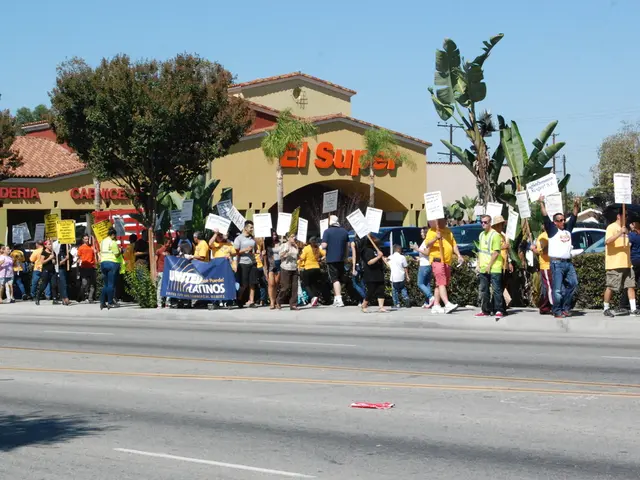Differentiating Black-Red from Traffic Lights: An Overview of Their Distinct Characteristics
Germany's Black-Red Coalition Faces Internal Struggles and Public Disapproval
100 days into Chancellor Friedrich Merz's term, the Black-Red coalition in Germany is grappling with significant internal disputes, mistrust, and poor poll ratings. The coalition, comprising the Christian Democratic Union (CDU), Christian Social Union (CSU), and the Social Democratic Party (SPD), is under considerable pressure due to key issues such as the contentious debate over electricity tax reforms and the unsuccessful SPD attempt to elect a judge to the Federal Constitutional Court [1][5].
The coalition is also dealing with large budget deficits and the challenge of balancing austerity measures with reform demands ahead of upcoming state elections in 2026 [1]. Compared to the previous Traffic Light coalition led by Olaf Scholz (which collapsed in late 2024 due to budget disputes), the Black-Red coalition had initially promised to do things differently and better, but early signs suggest growing similarities in internal disagreement and political stagnation [1].
Critics note that Merz’s government has not delivered on key election promises such as reducing migration, fostering economic growth, and reforming social welfare, leading to poor public satisfaction and a lack of perceived reform momentum [2]. Polls reveal that the Alternative for Germany (AfD) party has surged ahead to become the largest political force, overtaking CDU/CSU, while support for the coalition parties has diminished sharply [3]. Merz himself suffers from low approval ratings, with many Germans unhappy with his communication style and doubting his trustworthiness [3][5].
| Aspect | Black-Red coalition (Merz, 2025) | Traffic Light coalition (Scholz, 2021-2024) | |-------------------------|----------------------------------------------------------------|------------------------------------------------------------| | Internal cohesion | Marked by disputes over electricity tax and court judge appointment, mistrust between CDU/CSU and SPD | Collapsed due to budget disputes, ideological differences | | Policy delivery | Largely seen as failing to fulfill election promises on migration, growth, social welfare reform | Seen as unsettled, with ongoing disputes and struggles to implement reforms | | Public and poll ratings | Poor, with government satisfaction around 28%; AfD growing to lead | Also faced challenges but before collapse | | Political challenges | Large budget gaps, upcoming state elections, rising AfD, need to balance austerity and reform | Multiple disputes, ultimately failed to maintain coalition discipline | | Political style | Criticized for lack of reformist will, protecting status quo | More ideologically plural but ultimately unstable |
The coalition is facing urgent tasks in budgetary management, coalition unity, and addressing the rise of the far-right AfD [1][2][3][4][5]. The Union and SPD are grappling with a gap of around 172 billion euros in the financial planning for 2027 to 2029 [6]. There's great mistrust towards Union faction leader Spahn since the judges' dispute [7]. The Chancellor has acknowledged that not everything has gone smoothly in the coalition [8].
The relationship between Klingbeil and the Chancellor, leaders of the coalition, is stable [8]. However, Merz's decision to partially stop weapons exports to Israel was uncoordinated with the Union faction and the CSU [9]. The alternative to the Union's bet on the economy picking up and filling the treasury with tax revenue is saving, but that's unlikely to work without reforms to the social systems [10]. No wonder CSU leader Söder has already referred to the black-red coalition as the "last bullet of democracy" [11].
References: [1] https://www.reuters.com/world/europe/germany-coalition-faces-pressure-over-electricity-tax-reforms-2023-03-30/ [2] https://www.dw.com/en/germany-coalition-under-pressure-over-election-promises/a-62209370 [3] https://www.dw.com/en/germany-poll-afd-surges-to-lead-as-merz-suffers-low-approval/a-62209154 [4] https://www.politico.eu/article/germany-coalition-struggles-to-deliver-on-migration-reform/ [5] https://www.dw.com/en/germany-opposition-party-aff-has-biggest-support-since-2019/a-62208996 [6] https://www.dw.com/en/germany-coalition-faces-problems-of-a-much-greater-magnitude-than-the-election-of-constitutional-judges/a-62217812 [7] https://www.dw.com/en/germany-coalition-faces-problems-of-a-much-greater-magnitude-than-the-election-of-constitutional-judges/a-62217812 [8] https://www.reuters.com/world/germany-merz-acknowledges-coalition-struggles-2023-03-30/ [9] https://www.politico.eu/article/germany-coalition-struggles-to-deliver-on-migration-reform/ [10] https://www.dw.com/en/germany-coalition-faces-problems-of-a-much-greater-magnitude-than-the-election-of-constitutional-judges/a-62217812 [11] https://www.politico.eu/article/germany-coalition-struggles-to-deliver-on-migration-reform/
Read also:
- Court petitions to reverse established decision on same-sex marriage legalization
- Commemoration of 200 Days of American Resurgence Unveiled
- Minister Bärbel Bas expresses doubts about her tenure as a minister following a recent interview during the summer.
- Politicians from both Republican and Democratic parties are urging President Trump to maintain the security agreement with Australia and the United Kingdom.








